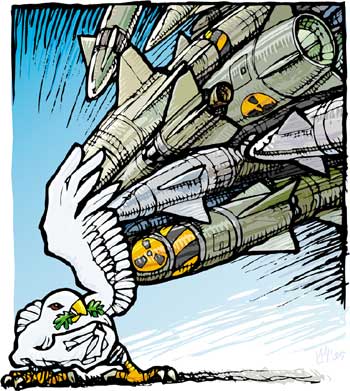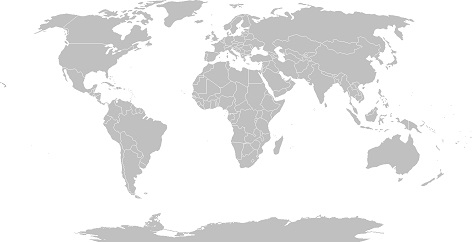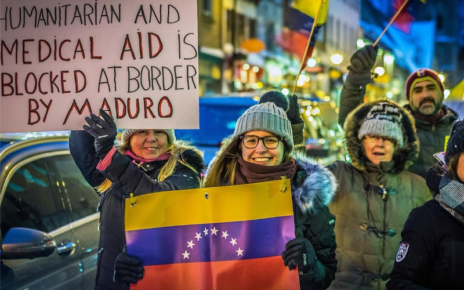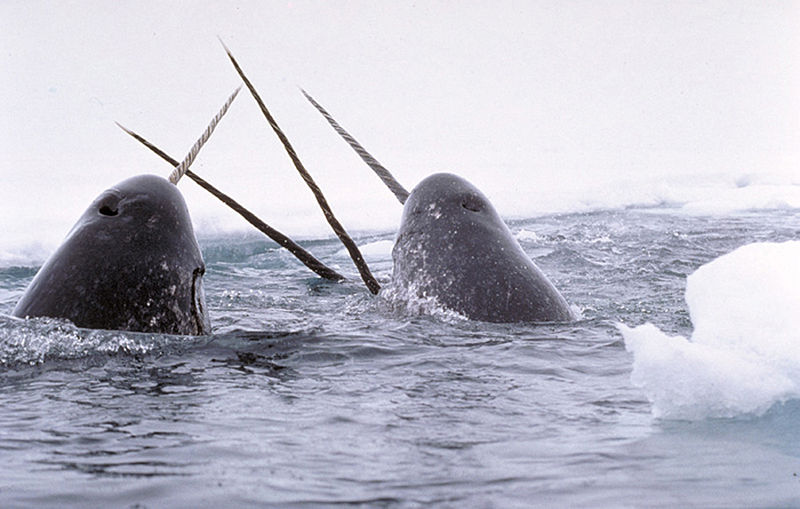 On the international-level, the increasing presence of nuclear weapons in the Arctic is directly in opposition to the global push for disarmament. Greater militarization and nuclearization of the Arctic is problematic because of the risk that a nuclear power state will take the opportunity to exploit the geographic landscape of the region to conceal nuclear submarines. This would ultimately reintroduce the Arctic as a nuclear theatre of operation. Within the Arctic, there is already a large concentration of nuclear sources including military and civilian nuclear ships, nuclear weapons, stored new and spent nuclear fuel, solid nuclear waste, and nuclear power plants. Undeniably, the Non-Proliferation Treaty (NPT) and regional de-nuclearization treaties – Nuclear-Weapon-Free Zones (NWFZs) – have been an important part of the global efforts to prevent the spread of nuclear weapons. Therefore, anything that might assist worldwide efforts to prevent nuclear proliferation is worth pursuing as vigorously as possible.
On the international-level, the increasing presence of nuclear weapons in the Arctic is directly in opposition to the global push for disarmament. Greater militarization and nuclearization of the Arctic is problematic because of the risk that a nuclear power state will take the opportunity to exploit the geographic landscape of the region to conceal nuclear submarines. This would ultimately reintroduce the Arctic as a nuclear theatre of operation. Within the Arctic, there is already a large concentration of nuclear sources including military and civilian nuclear ships, nuclear weapons, stored new and spent nuclear fuel, solid nuclear waste, and nuclear power plants. Undeniably, the Non-Proliferation Treaty (NPT) and regional de-nuclearization treaties – Nuclear-Weapon-Free Zones (NWFZs) – have been an important part of the global efforts to prevent the spread of nuclear weapons. Therefore, anything that might assist worldwide efforts to prevent nuclear proliferation is worth pursuing as vigorously as possible.
The NPT is the foundation of the global non-proliferation regime. The NPT envisions the end of all nuclear weapons. It provides (a) that states that did not possess nuclear weapons as of 1967 agree not to obtain them, and (b) that states that do possess them agree to divest themselves of these weapons over time. The reference to a Nuclear Weapons Free Zone (NWFZ) in the Arctic was mentioned at the United Nations (U.N) when the U.N First Committee met to discuss matters of disarmament in 2011.
Danish Ambassador Theis Truelsen, Under- Secretary for Disarmament, Non-proliferation and Arms Control at the Ministry of Foreign Affairs, stated in a presentation to the First Committee of the UN General Assembly in 2011 that Denmark supported such a zone. Denmark, a member of the North Atlantic Treaty Organization (NATO), was the first circumpolar state in the Arctic to publicly support an ANWFZ.
There is a renewed international recognition among the United Nations, since the Cold War era, of nuclear-weapon-free zones as an element of nonproliferation and nuclear disarmament. The renewed international recognition of NWFZs, by U.N member states, reflects the international norms against nuclear proliferation and the global push for disarmament, and so re-militarization of the Arctic contradicts these stated international norms.
At the 2010 Non Proliferation Treaty (NPT) Review Conference, most non-aligned countries praised the New Strategic Arms Reduction Treaty (START) U.S-Russian arms-control agreement, and supported the creation of nuclear-power inspection protocols. This shows that agreements on disarmament can contribute to the goal of non-proliferation. The NPT remains the basis of the entire system of international control and inspection of nuclear weapons.
Furthermore, civil society groups have also supported the minimization and elimination of nuclear weapons. Initiatives such as the Global Zero campaign, Pugwash, Mayors for Peace, and the Middle Powers Initiative urge concrete steps to end our reliance on nuclear weapons. Albeit different in their methods, all of these NGOs share the common goal of a world without nuclear weapons. It can reasonably be argued that there is an international norm that seeks to prevent nuclear warfare.




